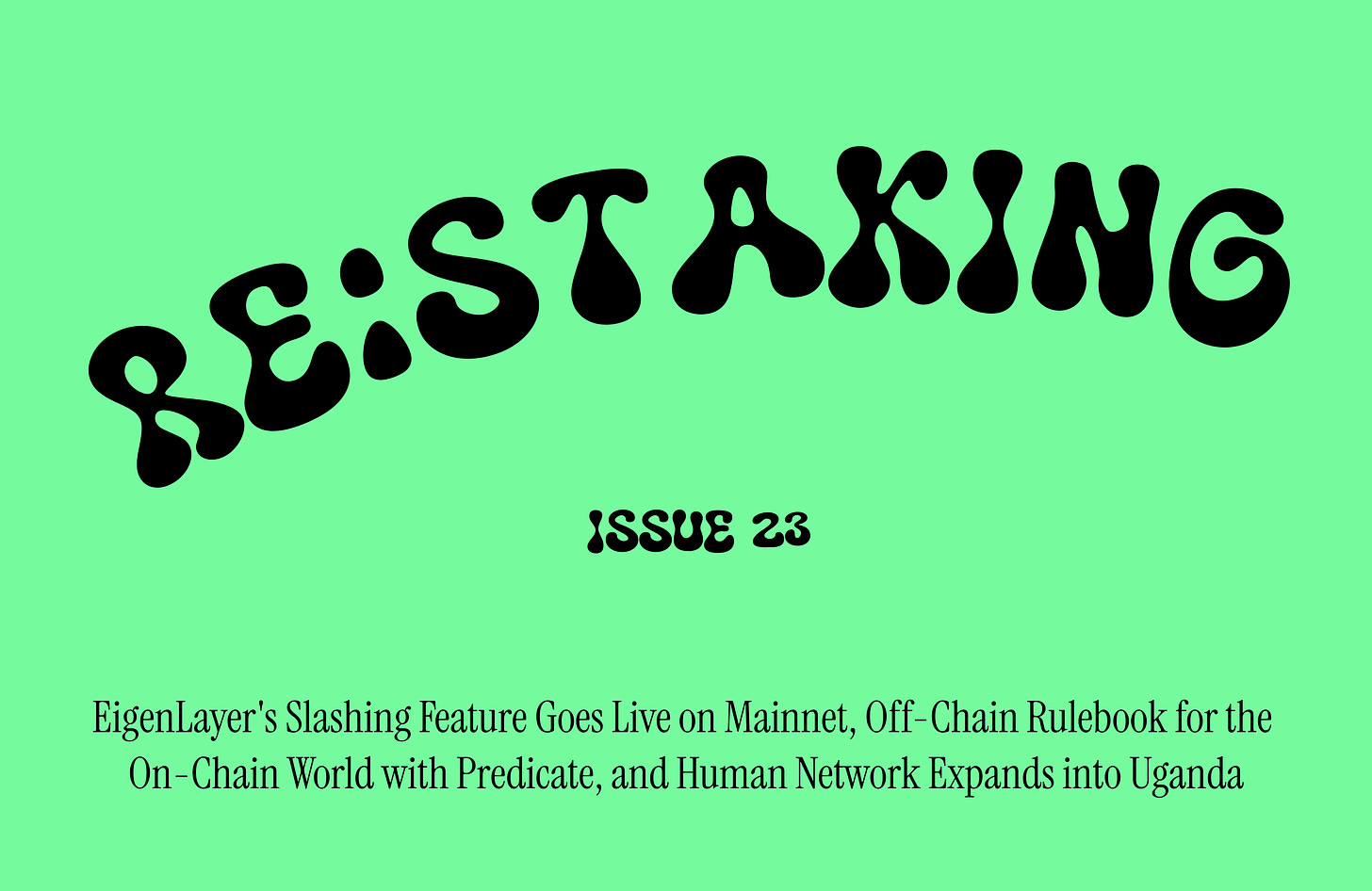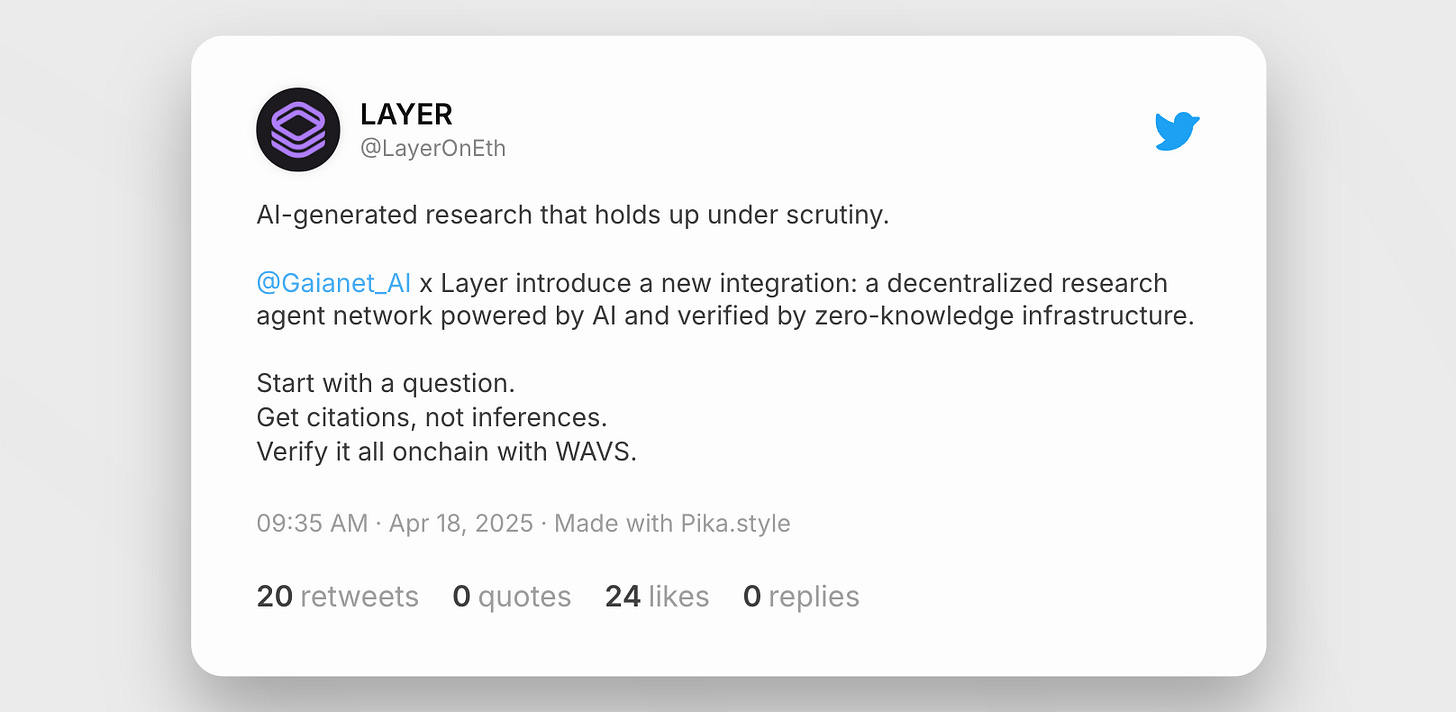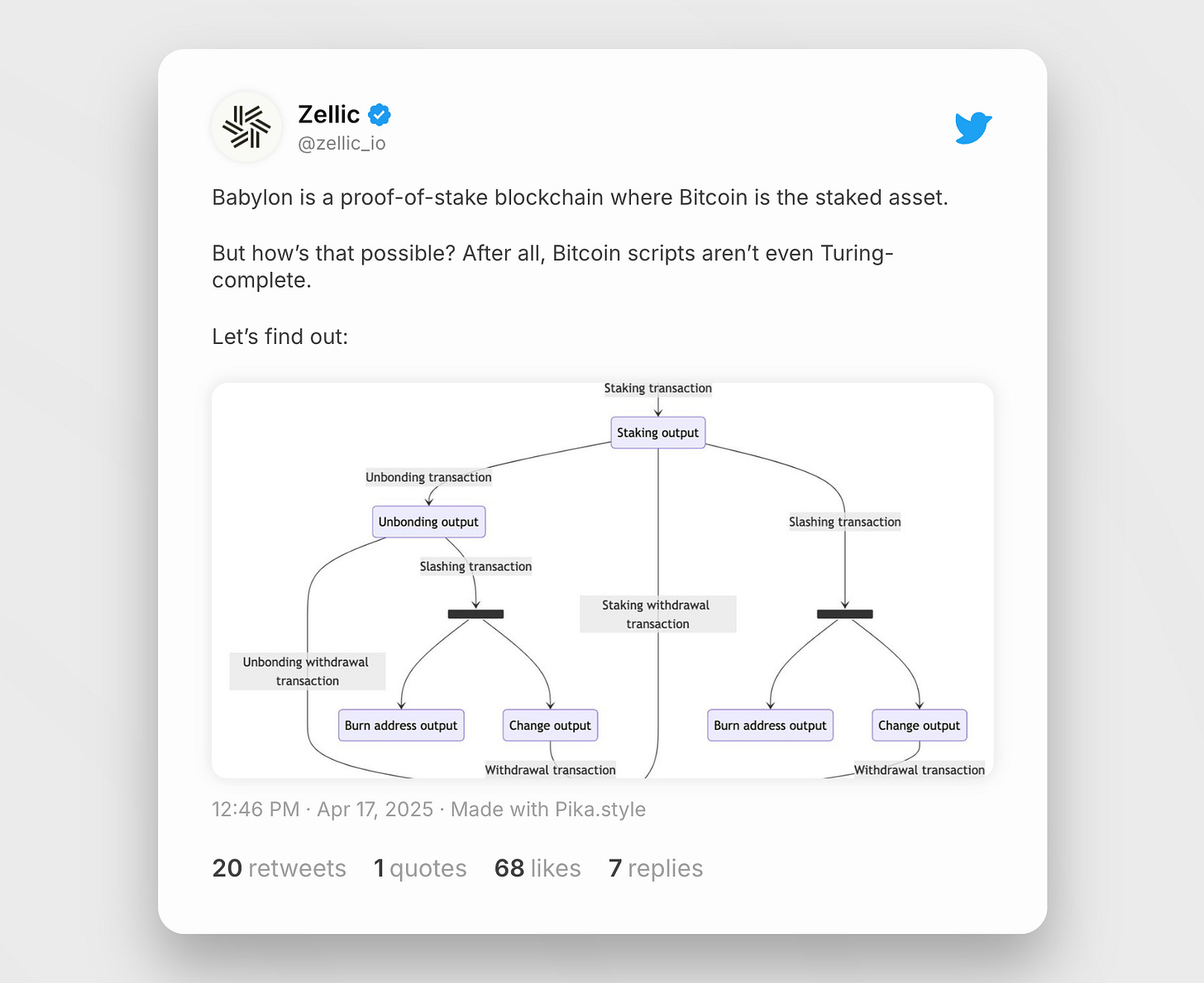Re:Staking Weekly #23
EigenLayer's Slashing Feature Goes Live on Mainnet, Off-Chain Rulebook for the On-Chain World with Predicate, and Human Network Expands into Uganda
Welcome to Issue #23 of Re:Staking Weekly! 👋
This week’s headline is, of course, the mainnet launch of EigenLayer’s slashing feature. But that’s not all — we also sat down with Predicate’s Founder and CEO, Nikhil Raghuveera, to dive into why compliance needs programmable trust, and how EigenLayer helps Predicate stay credibly neutral in a multi-polar world.
Also in this issue: Human Network expands into Uganda, Layer partners with Gaia on verifiable research agents, Sui integrates with Babylon’s BTC restaking, Othentic rolls out multichain support, and more.
Let’s go! 🚀
Off-Chain Rulebook for the On-Chain World
Compliance, the boring ol’ subject that became trendy around 2021 and vanished in the feat of gaining relevance. Companies like Stripe treated it as one of the most important bottlenecks, while others saw it as fundamentally incompatible with the crypto ethos. Predicate was born between the tension of these movements and spearheaded a way forward. What’s different about their view of compliance, and why should it matter more than the many who came before?
I had the opportunity to chat with Nikhil Raghuveera, founder and CEO of Predicate, and we unpacked Predicate’s founding journey — what they’re building, why it’s resonating, and where it’s heading.
1. Tackling Compliance via Expressiveness
Predicate doesn’t see the new era of compliance as a box-checking exercise or a KYC collection ritual. Instead, they think in terms of policies — customizable logic that can be defined and enforced programmatically. Rather than forcing users through rigid KYC pipelines, developers can now define nuanced pre-transaction rules based on things like jurisdiction, transaction type, address reputation, or even time of day.
The goal is simple: give builders full expressivity to implement exactly the rules their use case demands. That flexibility unlocks a virtually infinite design space and enables Predicate to plug into partners like TRM, layering compliance logic over diverse data sources. Suddenly, this isn’t just about compliance anymore — it’s about programmable control. Predicate can enforce minting rules for stablecoins, create custom filters for privacy-preserving bridges, or apply institutional-grade risk controls, all before a single transaction hits the chain.
2. Why Censorship Resistance Is Non-Negotiable
If Predicate were just another centralized middleware startup offering compliance APIs, none of this would matter. But they’re not. The team has a hardline stance: if you want policy infrastructure to matter — to actually scale globally — it must be censorship-resistant. No one, not even Predicate, should be the arbiter of which policies can or can’t exist.
So they flipped the model. Predicate isn’t policy-as-a-service. It’s an open, on-chain system where any project, developer, or DAO can define and enforce their own policies, no gatekeeping required. That neutrality is crucial for global adoption — a stablecoin issuer in Nigeria shouldn’t be beholden to rules set by a Delaware C-corp. Policy logic must reflect the intent of the builder, not the limitations of the provider.
3. From Aleo to Uniswap: Early Traction and Use Cases
Predicate is already live, with its first production implementation on Aleo. Transactions bridging from Ethereum to Aleo are now pre-checked by Predicate — a crucial upgrade for privacy-focused chains where compliance isn’t just sensitive, it’s existential.
Next up: Uniswap and Plume. Uniswap is integrating Predicate for selective enforcement within its v4 hooks architecture. Plume, an RWA-focused rollup, is taking a more centralized approach. What’s notable is how Predicate handles both extremes: DAO-led governance or top-down project teams. That flexibility is proving to be a key differentiator.
As more applications evolve from simple interfaces to structured economic zones, Predicate’s ability to enforce business logic before execution — without compromising decentralization — becomes increasingly attractive.
4. No Token, No Slashing — Yet
Predicate is built on EigenLayer, but you won’t find a token, slashing, or fee switch — at least not yet. Like Opacity, they’re following a playbook that’s quietly becoming the new standard among the AVSs: prove utility first, evolve the economics later.
Today, their operator network is small, permissioned, and intentionally lightweight. This phase is about building a credible, product-driven AVS — not papering over a weak product with token incentives. Down the line, Predicate may activate slashing, introduce rewards, or experiment with token mechanics — but only if the demand is there and the model makes sense.
The long-term goal is clear: economic and governance control must move from the company to the network. If the policy layer is going to be real infrastructure, it has to be credibly neutral. And neutrality starts with giving the ecosystem — not a single company — the keys to the machine.
In a world where every crypto product is scrambling for yield, Predicate quietly positions itself as something more fundamental: programmable rules for the internet of value. The boring compliance layer? Maybe. But also, maybe, the most important thing we haven’t gotten right — until now.
Learn More:
News Bites
You’ve probably already seen the big news this week: EigenLayer’s slashing feature is now live on Ethereum mainnet, making the protocol feature-complete. The next milestone is adoption—with Infura’s DIN and LayerZero integrations leading the way.
Infura’s DIN AVS is now live on testnet. It’s one of the few AVSs set to support slashing from day 1.
Explore a different perspective on slashing from EigenLayer’s competitor, Symbiotic.
Human Network, a decentralized identity and payment protocol secured by EigenLayer, has completed its first transaction in Uganda.
Layer, an AVS framework, has announced a collaboration with Gaia Network to build a verifiable research agent network.
Curious about how Babylon’s BTC restaking network works under the hood? Check out this deep dive from Zellic.
Sui is joining Babylon’s BTC restaking protocol, expanding its reach into Bitcoin-backed security.
Othentic rolls out multichain support to power the next wave of AVS projects.
Check out Cap’s founder Benjamin on DeFi Dad’s podcast. Cap is a stablecoin protocol built on EigenLayer’s shared security. Unlike traditional setups, Cap’s operators generate their own yield strategies and compete against one another.
EigenLayer’s Sepolia testnet is now live, offering a more stable experience than the previous Holesky testnet.
That's it for this week's newsletter! As always, feel free to send us a DM or comment directly below with your thoughts or questions.
If you want to catch up with the latest news in the restaking world, give our curated X list a follow!
See you next week and thanks for reading,











